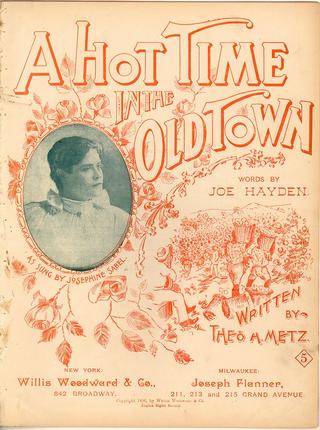Josephine Sabel on:
[Wikipedia]
[Google]
[Amazon]
Josephine Domingue Sabel (October 3, 1866 – December 24, 1945) was an American singer and comedian, billed as "The Queen of Song" in
 Sabel was a vaudeville performer for many years, billed as "The Queen of Song." She popularized songs including " A Hot Time in the Old Town Tonight", "Somebody Loves Me", and "
Sabel was a vaudeville performer for many years, billed as "The Queen of Song." She popularized songs including " A Hot Time in the Old Town Tonight", "Somebody Loves Me", and ""At the Theaters"
''The Capital'' (February 15, 1902): 16.
"Josephine Sabel: The Queen of Song"
''Travalanche'' (October 3, 2013). Blog post about Sabel, with photo. {{DEFAULTSORT:Sabel, Josephine 1866 births 1945 deaths 20th-century American singers American women comedians Vaudeville performers People from Lawrence, Massachusetts Comedians from Massachusetts 20th-century American women singers
vaudeville
Vaudeville (; ) is a theatrical genre of variety entertainment born in France at the end of the 19th century. A vaudeville was originally a comedy without psychological or moral intentions, based on a comical situation: a dramatic composition ...
.
Early life
Josephine Domingue was born inLawrence, Massachusetts
Lawrence is a city located in Essex County, Massachusetts, United States, on the Merrimack River. At the 2020 census, the city had a population of 89,143. Surrounding communities include Methuen to the north, Andover to the southwest, and Nort ...
."Josephine Sabel" ''New York Times'' (December 25, 1945): 23. via ProQuest
ProQuest LLC is an Ann Arbor, Michigan-based global information-content and technology company, founded in 1938 as University Microfilms by Eugene B. Power. ProQuest is known for its applications and information services for libraries, provid ...
Career
 Sabel was a vaudeville performer for many years, billed as "The Queen of Song." She popularized songs including " A Hot Time in the Old Town Tonight", "Somebody Loves Me", and "
Sabel was a vaudeville performer for many years, billed as "The Queen of Song." She popularized songs including " A Hot Time in the Old Town Tonight", "Somebody Loves Me", and "Bicycle Built for Two
"Daisy Bell (Bicycle Built for Two)" is a song written in 1892 by British songwriter Harry Dacre with the well-known chorus "Daisy, Daisy / Give me your answer, do. / I'm half crazy / all for the love of you", ending with the words "a bicycle bu ...
". She also sang " coon songs" that caricatured African-American speech and culture, for example "Bye Bye Belinda" (written by H. Y. Leavitt, billed as a "Darktown Triumph") and "Little Alabama Coon", an 1893 hit song written by Hattie Starr. She continued performing late in her life, as a nostalgia act in the 1930s.
Sabel's Broadway credits included roles in the musicals ''Punch, Judy and Company'' (1903), ''Earl Carroll's Vanities'' (1925), ''Oh Please'' (1925-1926), and ''Sidewalks of New York'' (1927-1928). She appeared in several films: ''Corn Top Bread'' (1930), ''The March of Time
''The March of Time'' is an American newsreel series sponsored by Time Inc. and shown in movie theaters from 1935 to 1951. It was based on a radio news series broadcast from 1931 to 1945. The "voice" of both series was Westbrook Van Voorhis. Pr ...
'' (1930, unfinished), and ''Broadway to Hollywood'' (1933).
Sabel was not known for a pleasing voice, but for her humor and stage presence. "Miss Sabel does not sing much, and never did," explained a newspaper account in 1904, "Most of her singing is yelling, but she yells well." Critic Frank Norris wrote of her, "Josephine Sabel is not what you would call pretty, but she is French to her fingers and toes, which is much better. She can do precisely what she likes with her audiences — making them laugh or weep or whistle at her will." She emphasized her French connections with the latest fashions from Paris, so that her clothing on and off stage were described in detail in the press.''The Capital'' (February 15, 1902): 16.
Personal life
Josephine Domingue married David Sabel, her manager. She died in 1945, aged 79 years, at a care home inPatchogue, New York
Patchogue (, ) is a Administrative divisions of New York#Village, village in Suffolk County, New York. The population was 11,798 at the time of the 2010 census. Patchogue is part of the Town (New York), town of Brookhaven, New York, Brookhaven, on ...
where she had lived since 1937.
References
External links
* * * Trav S. D."Josephine Sabel: The Queen of Song"
''Travalanche'' (October 3, 2013). Blog post about Sabel, with photo. {{DEFAULTSORT:Sabel, Josephine 1866 births 1945 deaths 20th-century American singers American women comedians Vaudeville performers People from Lawrence, Massachusetts Comedians from Massachusetts 20th-century American women singers